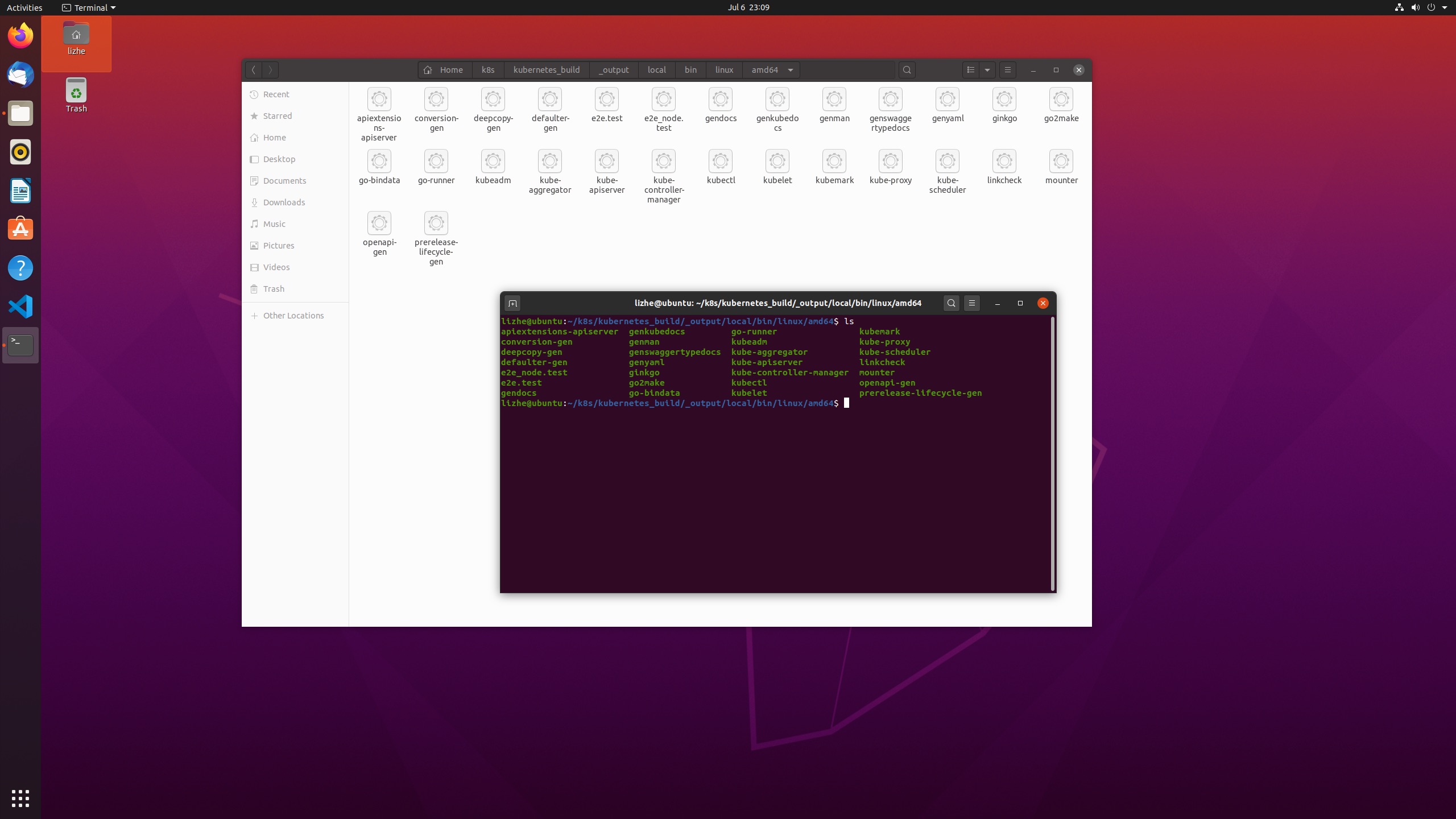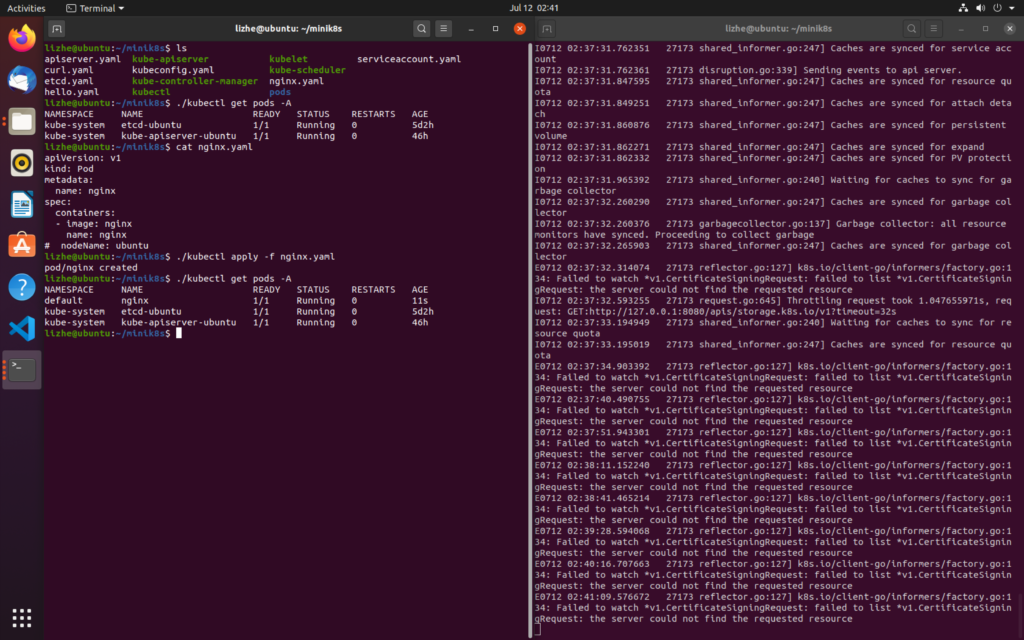曾几何时,我第一次使用kubeadm安装 kubernetes 1.10 时,kubernetes自带的还是 kube-dns,
在一些教材中也一直把kube-dns作为dns服务在k8s上的默认实现。
趁此机会这里我要好好捋一捋,在kubernetes1.11开始,CoreDNS就开始作为 kubeadm的默认实现了
传统的kubeDNS由3个部分组成
- kubedns: 依赖
client-go中的informer机制监视 k8s 中的Service和Endpoint的变化,并将这些结构维护进内存来服务内部 DNS 解析请求。 - dnsmasq: 区分 Domain 是集群内部还是外部,给外部域名提供上游解析,内部域名发往 10053 端口,并将解析结果缓存,提高解析效率。
- sidecar: 对 kubedns 和 dnsmasq 进行健康检查和收集监控指标。
在 kubedns 包含两个部分, kubedns 和 skydns。
其中 kubedns 是负责监听 k8s 集群中的 Service 和 Endpoint 的变化,并将这些变化通过 treecache 的数据结构缓存下来,作为 Backend 给 skydns 提供 Record。 而真正负责dns解析的其实是 skydns(skydns 目前有两个版本 skydns1 和 skydns2)
对于新版本的kubernetes,默认已经开始使用CoreDNS了

CoreDNS 是一个高速并且十分灵活的DNS服务。CoreDNS 允许你通过编写插件的形式去自行处理DNS数据。

CoreDNS 定义了一套插件的接口,只要实现 Handler 接口就能将插件注册到插件链中
kubernetes 插件可以让 coreDNS 读取到k8s集群内的 endpoint 以及 service 等信息,从而替代 kubeDNS 作为 k8s 集群内的 DNS 解析服务
为了指定dns服务器地址,这里我需要重新启动 kubelet并且指定新的配置文件
kind: KubeletConfiguration
apiVersion: kubelet.config.k8s.io/v1beta1
address: 127.0.0.1
port: 10250
readOnlyPort: 10255
cgroupDriver: cgroupfs
clusterDNS:
- "10.0.0.10"
clusterDomain: cluster.local.
failSwapOn: false
authentication:
anonymous:
enabled: truesudo ./kubelet --pod-manifest-path=pods --fail-swap-on=false --pod-infra-container-image=registry.aliyuncs.com/google_containers/pause:3.2 --kubeconfig=kubeconfig.yaml --config=kubeletconfig.yaml安装 coredns
CoreDNS 是通过yaml文件安装到kubernetes的
git clone https://github.com/coredns/deployment
需要使用的是 kubernetes 文件夹下的 deploy.sh
/home/lizhe/dns/deployment/kubernetes/deploy.sh
不过使用之前需要做一些修改,因为我们没有安装kube-dns,所以脚本会报错,
#CLUSTER_DNS_IP=$(kubectl get service –namespace kube-system kube-dns -o jsonpath=”{.spec.clusterIP}”)
修改为
CLUSTER_DNS_IP=10.0.0.10

./deploy.sh 10.0.0.10/24 cluster.local > coredns.yaml这样会得到 coredns.yaml 内容如下
apiVersion: v1
kind: ServiceAccount
metadata:
name: coredns
namespace: kube-system
---
apiVersion: rbac.authorization.k8s.io/v1
kind: ClusterRole
metadata:
labels:
kubernetes.io/bootstrapping: rbac-defaults
name: system:coredns
rules:
- apiGroups:
- ""
resources:
- endpoints
- services
- pods
- namespaces
verbs:
- list
- watch
---
apiVersion: rbac.authorization.k8s.io/v1
kind: ClusterRoleBinding
metadata:
annotations:
rbac.authorization.kubernetes.io/autoupdate: "true"
labels:
kubernetes.io/bootstrapping: rbac-defaults
name: system:coredns
roleRef:
apiGroup: rbac.authorization.k8s.io
kind: ClusterRole
name: system:coredns
subjects:
- kind: ServiceAccount
name: coredns
namespace: kube-system
---
apiVersion: v1
kind: ConfigMap
metadata:
name: coredns
namespace: kube-system
data:
Corefile: |
.:53 {
errors
health {
lameduck 5s
}
ready
kubernetes cluster.local in-addr.arpa ip6.arpa {
fallthrough in-addr.arpa ip6.arpa
}
prometheus :9153
forward . /etc/resolv.conf {
max_concurrent 1000
}
cache 30
loop
reload
loadbalance
}
---
apiVersion: apps/v1
kind: Deployment
metadata:
name: coredns
namespace: kube-system
labels:
k8s-app: kube-dns
kubernetes.io/name: "CoreDNS"
spec:
# replicas: not specified here:
# 1. Default is 1.
# 2. Will be tuned in real time if DNS horizontal auto-scaling is turned on.
strategy:
type: RollingUpdate
rollingUpdate:
maxUnavailable: 1
selector:
matchLabels:
k8s-app: kube-dns
template:
metadata:
labels:
k8s-app: kube-dns
spec:
priorityClassName: system-cluster-critical
serviceAccountName: coredns
tolerations:
- key: "CriticalAddonsOnly"
operator: "Exists"
nodeSelector:
kubernetes.io/os: linux
affinity:
podAntiAffinity:
preferredDuringSchedulingIgnoredDuringExecution:
- weight: 100
podAffinityTerm:
labelSelector:
matchExpressions:
- key: k8s-app
operator: In
values: ["kube-dns"]
topologyKey: kubernetes.io/hostname
containers:
- name: coredns
image: coredns/coredns:1.7.0
imagePullPolicy: IfNotPresent
resources:
limits:
memory: 170Mi
requests:
cpu: 100m
memory: 70Mi
args: [ "-conf", "/etc/coredns/Corefile" ]
volumeMounts:
- name: config-volume
mountPath: /etc/coredns
readOnly: true
ports:
- containerPort: 53
name: dns
protocol: UDP
- containerPort: 53
name: dns-tcp
protocol: TCP
- containerPort: 9153
name: metrics
protocol: TCP
securityContext:
allowPrivilegeEscalation: false
capabilities:
add:
- NET_BIND_SERVICE
drop:
- all
readOnlyRootFilesystem: true
livenessProbe:
httpGet:
path: /health
port: 8080
scheme: HTTP
initialDelaySeconds: 60
timeoutSeconds: 5
successThreshold: 1
failureThreshold: 5
readinessProbe:
httpGet:
path: /ready
port: 8181
scheme: HTTP
dnsPolicy: Default
volumes:
- name: config-volume
configMap:
name: coredns
items:
- key: Corefile
path: Corefile
---
apiVersion: v1
kind: Service
metadata:
name: kube-dns
namespace: kube-system
annotations:
prometheus.io/port: "9153"
prometheus.io/scrape: "true"
labels:
k8s-app: kube-dns
kubernetes.io/cluster-service: "true"
kubernetes.io/name: "CoreDNS"
spec:
selector:
k8s-app: kube-dns
clusterIP: 10.0.0.10
ports:
- name: dns
port: 53
protocol: UDP
- name: dns-tcp
port: 53
protocol: TCP
- name: metrics
port: 9153
protocol: TCP
这里不要忘记对应一下 kube-proxy和kubelet 配置文件中的 CIDR

调用apply加载这个yaml

这里我得到如下错误
failed with No API token found for service account “coredns”

docker pull coredns/coredns:1.7.0
两个解决方案,
禁用ServiceAccount
配置ServiceAccount秘钥
这里直接选简单粗暴的
将:KUBE_ADMISSION_CONTROL=”–admission-control=NamespaceLifecycle,NamespaceExists,LimitRanger,SecurityContextDeny,ServiceAccount,ResourceQuota”
改为:KUBE_ADMISSION_CONTROL=”–admission-control=NamespaceLifecycle,NamespaceExists,LimitRanger,SecurityContextDeny,ResourceQuota”
也就是停掉目前运行的 apiserver,使用下面的命令代替
sudo ./kube-apiserver –etcd-servers=http://127.0.0.1:2379 –service-cluster-ip-range=10.0.0.0/24 –admission-control=NamespaceLifecycle,NamespaceExists,LimitRanger,SecurityContextDeny,ResourceQuota
可以看到 coredns 加载了,但是启动失败

得到了下面错误,这里我在简装版集群上安装 coredns 的尝试暂时宣告失败
Couldn’t find network status for kube-system/coredns-6bb956f586-xr4sn through plugin: invalid network status for







